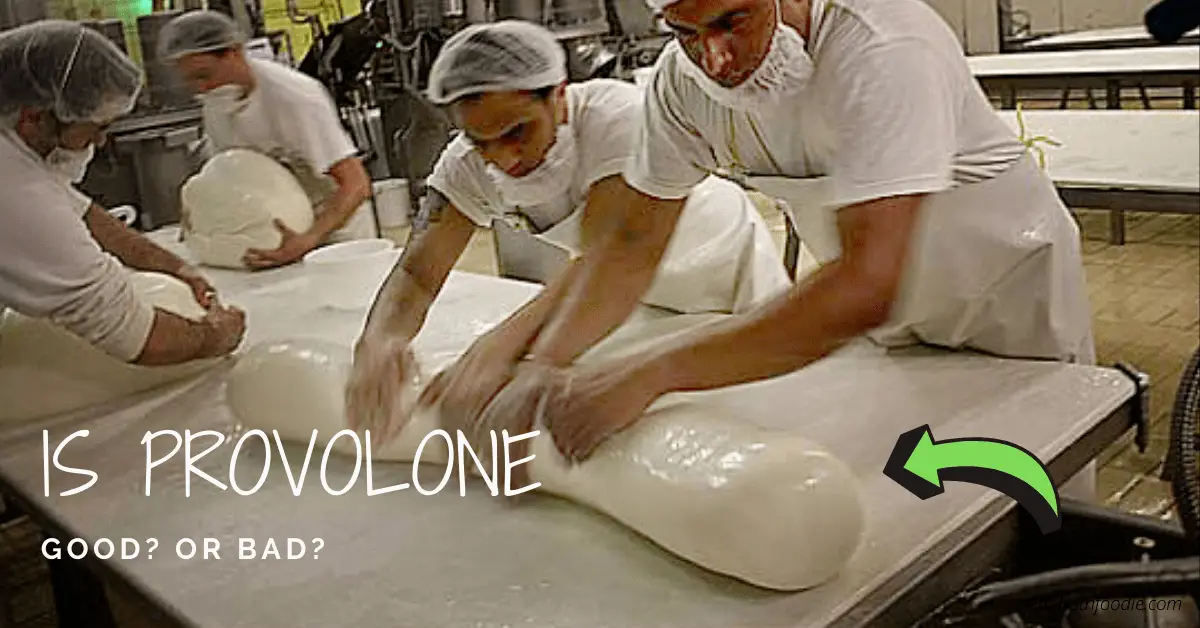Why Provolone is Good (and Bad)?
The popularity of cheese has increased drastically in the last 50 years.
According to latest statistics, consumption of cheese has increased 3-fold in some countries like USA between 1970 to 2009 (1).
Some experts also blame cheese to be the cause of obesity epidemic in western countries as cheese is an essential and integral component of most high calorie diets such as burgers, pizzas, hoagies, sandwiches, dips, as well as sauces and pastries and soups.
Compare calories amount in 100+ types of cheese in this article.
But is cheese really that bad?
Latest research and clinical trials suggest otherwise. When consumed in moderation, some varieties of cheese are extremely helpful in promoting overall health and wellness in individuals.
Why is Provolone a Good Cheese?
Provolone cheese is an Italian cheese that is classified under Pasta Filata, a term that means pulled or stretched out curd.
Depending upon the aging duration of cheese, it may have a smooth flavor and soft texture (dolce provolone like this one that is aged for 2-3 months) or a strong, pungent taste (Piccante provolone here via Amazon that is aged for 6-12 months).
Provolone is a healthy dairy product that is rich in macro and micronutrients, and serve following health benefits:
- Bone Health: Calcium is the key micronutrient that is needed for the healthy growth and remodeling of bones. An adult male and female require 1,000mg of calcium to maintain optimal health – 1 oz. of provolone can suffice 20% of the daily recommended value; making it a great source of calcium. Besides calcium, provolone cheese also contains trace amounts of other bone building nutrients like Vitamin A, D & K, Magnesium, Zinc, and proteins.
- Dental Health: Calcium in provolone cheese also aids in teeth remodeling. According to a study, cheese consumption increases the pH of oral cavity that helps in reducing the formation of plaque; thus minimizing the risk of cavity formation.
- Cardiovascular health: it is a popular misconception that cheese aggravates the risk of heart diseases due to high sodium and cholesterol content, which is not true. The calcium present in cheese promotes cardiac health, reduce blood pressure and serve other important functions. In addition, according to a new study, provolone cheese along with other dairy products has glutathione (a powerful antioxidant) that can age related wear and tear in tissues and promotes brain and heart health (2). Another study suggested that individuals who consume dairy cheeses (such as provolone) had better blood vessel health than study participants who snacked on pretzels and soy cheese (3)
- Gut Health: Since cheese is an aged or fermented dairy product, it also aids in promoting gut health by maintaining balanced gut bacterial flora.
Who should consider Provolone cheese over other cheese varieties?
It is an exceptionally great option for individuals with certain health situations, such as
- Lactose intolerant individuals who lack the enzyme lactase – to degrade the milk sugar or lactose) and aid in the digestion of dairy products
- Individuals who do not like consuming dairy products due to milk allergy or personal preferences
- Pregnant women – since provolone is an aged cheese, the moisture content is really low, which makes the growth of hazardous bacterial agents like Listeria difficult.
- Gluten sensitive individuals
- Individuals on a weight loss diet (as these individuals usually have low calcium levels) and can greatly benefit from a balanced calcium intake
Is Provolone a superior option over other cheeses?
- Low lactose content:
If you are lactose tolerant, you are better off with cheeses that have lowest lactose content.
As part of the aging process, most of the lactose is drained off with whey and that’s why provolone cheese only contains trace amounts of lactose.
That is why provolone is generally well-tolerated even by individuals who are lactose intolerant.
- Regular provolone cheese contains 0.5 grams of lactose.
- Low fat provolone varieties have 0 grams of lactose.
This property makes provolone a superior cheese choice for lactose intolerant individuals, especially over cheese varieties like cottage cheese, cream cheese, Camembert or Brie, ricotta, and mozzarella.
- Longer Shelf Life:
As provolone is an aged cheese, it has a slightly longer shelf life, compared to similar Italian cheeses like mozzarella (link to Amazon) that is typically consumed fresh and may go bad if stored for too long.
- Moderate fat content:
Saturated fat (or bad lipids) causes several serious diseases in humans.
Most cheeses contain between 3-6 grams of saturated fats. Provolone supplies moderate amount of fat (4.8 grams / oz) and 20 mg of cholesterol; this is much lower than some other varieties of cheese:
- Saturated fat content of Cheddar cheese is 5.3g/oz whereas cholesterol is 28mg/oz
- Saturated fat content of cream cheese is 5.7g/oz whereas cholesterol is 29mg/oz
- Saturated fat content of Muenster cheese is 5.4g/oz whereas cholesterol is 27mg/oz
What is the ideal serving size?
According to latest recommendation of DGAC Dietary Guidelines Advisory Committee, total calorie intake from saturated fats should not exceed more than 10% of the daily calorie intake.
This suggests that someone who is on 2,000 calorie diet must not consume more than 20 grams of saturated fats per day.
So recommended serving size of provolone is 1 oz or 1 slice, which leaves enough room for other dietary sources (like Keto diet) that may yield saturated fats.
When to maintain caution?
Since provolone like many other cheeses is high in calories as well as saturated fats and sodium, it is recommended to watch your intake; especially if you have following health issues:
- Blood Pressure: Provolone cheese like other cheese varieties, is high in saturated fats that may aggravate the risk of cardiovascular issues if not consumed in moderation. Likewise, high sodium content may also pose threat to some susceptible individuals. Hypertensive individuals or people with high blood pressure can still enjoy provolone cheese if they are consuming in moderation and choosing low-sodium, light provolone over regular provolone.
- Obesity: 1 oz. of provolone supply 98 calories, which is fairly high. If not consumed in moderation, the risk of obesity may increase. Obesity in turn may aggravate the risk of other serious health issues like diabetes.
- Kidney Disease: Individuals with chronic renal disease should avoid consuming too much cheese as almost all cheese varieties are high in Phosphorous (which may promote bone health and wellness in a healthy individual), but may deteriorate renal health in people with compromised kidney function. 1 oz. of Provolone cheese has 138 mg of Phosphorous (equivalent to 14% of the recommended daily intake or about 20% of recommended intake in kidney disease patients).
- Casein allergy: Individuals who have known allergy to casein or milk protein should avoid provolone cheese as well as other cheeses.
- Certain Drugs: It is recommended to avoid ages cheeses such as provolone if you are on drugs like Monoamine oxidase inhibitors (used for the treatment of Parkinson’s disease and depression) due to possible risk of interaction with the drug.
Key Takeaway
Overall, the health benefits of provolone outweigh the cons; for example very few snacks can deliver 7.2 grams of proteins (about 14% of recommended daily intake), 7% recommended intake of Vitamin B12 and 5% recommended daily intake of Vitamin A and Riboflavin.
Why you should never eat provolone? Read the answer.
References:
- Lee, K. J., Kim, K. S., Kim, H. N., Seo, J. A., & Song, S. W. (2014). Association between dietary calcium and phosphorus intakes, dietary calcium/phosphorus ratio and bone mass in the Korean population. Nutrition journal, 13(1), 114.
- Choi, I. Y., Lee, P., Denney, D. R., Spaeth, K., Nast, O., Ptomey, L., … & Sullivan, D. K. (2015). Dairy intake is associated with brain glutathione concentration in older adults. The American journal of clinical nutrition, 101(2), 287-293.
- https://news.psu.edu/story/434732/2016/10/31/research/eating-dairy-cheese-may-protect-against-sodium-related-health-risks

